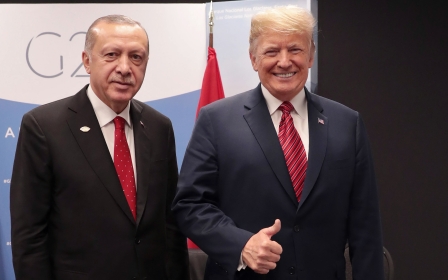Turkey asks White House to reject genocide recognition

The Turkish government asked the Trump administration to issue a public response to the US House of Representatives that recognised the Armenian genocide and passed a sanctions bill against Turkey on the country's national day, Middle East Eye has learned.
On Wednesday, the Turkish Foreign Ministry summoned US Ambassador David Satterfield for a dressing down over the congressional actions, a Turkish official told MEE, speaking on condition of anonymity because of diplomatic protocol.
Deputy Foreign Minister Yavuz Selim Kiran told the ambassador that the House's votes, which symbolically were passed on the 96th anniversary of the Turkish Republic, were unacceptable.
'This is absolutely a crushing majority. A complete disaster. It will get worse'
- Former Turkish official
“He also asked the Trump administration to issue a public statement opposing... the recognition of the genocide and the sanctions bill,” the Turkish official said.
Like previous US governments, the Trump administration has not formally recognised the Armenian genocide. Ankara rejects the term "genocide" and insists that the 1915 mass killings were part of a civil war that saw deaths on both sides.
New MEE newsletter: Jerusalem Dispatch
Sign up to get the latest insights and analysis on Israel-Palestine, alongside Turkey Unpacked and other MEE newsletters
Still, Armenians say that 1.5 million of their community were killed and hundreds of thousands more expelled.
Syria operation
The sanctions bill passed on Tuesday was linked to Turkey's ongoing military offensive in northeast Syria against US-backed Kurdish fighters.
Ankara's offensive was effectively waved through by President Donald Trump, who surprised everyone by saying earlier this month he was pulling troops from Syria's northeast.
That decision attracted severe criticism from even Trump's close allies, prompting the US to reach a ceasefire agreement with Turkey that has seen the assault slowed.
Turkish officials see the latest sanctions bill as reneging on that deal and suggest that the Trump administration should lobby Congress to stop any further sanctions.
US lawmakers don’t seem to agree with this sentiment.
Lindsey Graham, a Republican heavyweight in the Senate, said on Twitter on Tuesday night that he was impressed by the House of Representatives' bipartisan “takedown of Turkey’s invasion”. The vote was passed with overwhelming support from both Democrats and Republicans by 403-16.
“I expect the Senate will take up this cause and let Turkey unequivocally know that the United States will not sit on the sidelines as they create problems for us and our allies,” Graham said.
Similarly, the House of Representatives recognised the genocide in a non-binding resolution that was adopted with an overwhelming majority of 405 to 11.
Turkish officials noted this wasn't the first time that Congress has recognised the genocide. Similar resolutions were adopted in 1975 and 1984.
Still, a former senior Turkish official who has been closely involved with US issues told MEE that he has never seen Congress so united against Turkey before.
“This is absolutely a crushing majority. A complete disaster. It will get worse,” he said.
“If something like that had happened in the past, there would have been a complete breakdown of relations, but now everything is tied together with a spider's web.”
Washington visit uncertain
Senior Turkish officials condemned the congressional actions and insisted they were part of a US domestic agenda and to score political points.
Turkish President Recep Tayyip Erdogan dismissed the vote, saying Ankara didn't recognise the bills.
“We are saddened by the recognition of the [genocide] libel by a foreign country’s parliament,” he said.
“They took advantage of anti-Turkey sentiment in US public opinion. In a way, they were pretty much opportunistic.”
Erdogan also said that his scheduled visit to Washington on 13 November wasn’t certain anymore.
“There are question marks on this trip. I will make my decision later,” he said.
Turkish Foreign Minister Mevlut Cavusoglu accused US lawmakers of being angry, saying they felt Turkey had ruined their game plan in Syria by launching Operation Peace Spring against the US-backed Syrian Kurdish YPG militia.
The bills were also condemned by four of the five major parties in the Turkish parliament, who said in a joint statement that the move was an attempt to "darken the historical truths".
Parliament speaker Mustafa Sentop read the statement on the floor, making it a formal government document that will be published in the official gazette.
"Turkey won't bow down to the sanctions threats. The said actions by the US Congress are null and void for us," the statement said.
Sinan Ulgen, chairman of Istanbul-based independent think-tank EDAM, downplayed the significance of the congressional actions, noting that they had only been adopted by the House of Representatives.
"It is true that Turkey has lost some influence in Congress. Yet this isn't the first time the House recognised the genocide. It has happened two times in the past," he told MEE.
"I don't think it is likely that the Senate will pass the sanctions bill either. It would be a real problem if the Senate took the matter into its hands. Turkey responded to these actions with appropriate measures while maintaining its ties with the administration."
Middle East Eye delivers independent and unrivalled coverage and analysis of the Middle East, North Africa and beyond. To learn more about republishing this content and the associated fees, please fill out this form. More about MEE can be found here.





